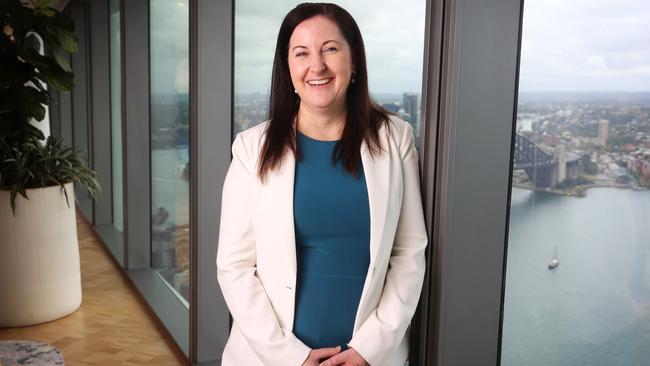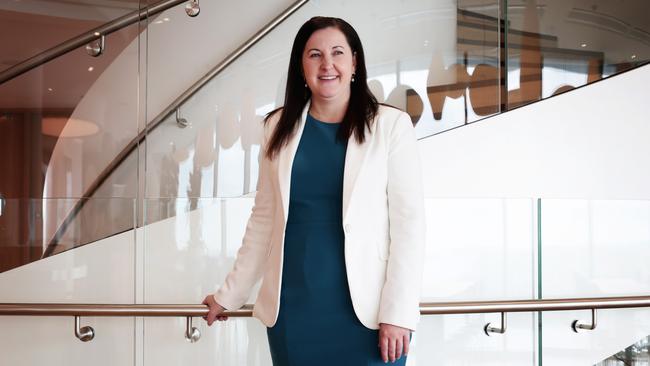Deloitte’s new boss Joanne Gorton prepares for climate reporting, tech shift
The audit and consulting sector is set to benefit as structural transformations related to technology and climate wash through Australia’s economy in coming years.

The audit and consulting sector is set to benefit as structural transformations related to technology and climate wash through Australia’s economy in coming years, the new boss of professional services giant Deloitte says.
Deloitte Australia’s new chief executive Joanne Gorton, who was appointed after a stint running the group’s audit and assurance operations, told The Australian it was a good time to be taking on the top job at one of the country’s big four professional services firms.
Ms Gorton, who started her career at Coopers & Lybrand (the predecessor to PwC Australia), said the professional services sector was poised to receive a rush of new business on the back of technology transformations and the introduction of new climate reporting rules.
These shifts would boost both audit and consulting prospects, with Ms Gorton noting they reflected “constant change” and opportunities in the broader economy.
Ms Gorton said the phased introduction of climate reporting wouldn’t produce a “big bang” of revenue growth for the audit firms, but said the impact of the new standards “won’t be insignificant because of the extent of the disclosures that are required in Australia”.
The elevation of Ms Gorton, who grew up on the NSW Central Coast kicked off her career as a cadet in 1996, comes after almost 30 years in the industry.
“I had the full support of my family, so I thought this would be a great opportunity to really have an impact and hopefully some fun along the way,” she said
The Western Sydney resident is one of the few non-harbourside bosses working in Sydney’s business district, with her commute from near Parramatta mirroring that of many employees within the firm.
Ms Gorton said she hoped to serve a full eight-year term at the top of Deloitte, noting her initial four-year stint would be both “a long time, but also a short time”.
“To have a true impact and take the business to where I’d love to see us, I would love to be able to do a full term,” she said.
The upgrade of ageing technology across the economy presents an opportunity for Ms Gordon and Deloitte, which repositioned itself locally under former CEO Adam Powick in a global restructure that combined the firm’s technology and transformation teams.
“There’s not a single exec I talk to who’s not talking about tech transformation. That’s very hard to do well and very hard to do in an affordable way,” she said.
But Ms Gorton, who started in the job on February 1, just days after turning 48, said the growth in business might not be matched by a lift in headcount at Deloitte, which employs 13,077 staff locally.
“That growth is going to be fuelled more by technology rather than by people,” Ms Gorton said.
“There’s likely to be some stabilisation there and I think that’s no different to companies in many different industries where our unemployment still sits at historically low levels.”

Ms Gorton said all firms faced a “natural limitation” to their size, noting the government faced the same pressures.
The consulting firms have been under pressure in recent years as the Albanese government stepped up a push to replace external consultants with public servants. Public servant numbers rose 3.6 per cent between June 2023 and June 2024.
This came amid broader growth in the government-adjacent jobs market, with the expansion of services such as the NDIS feeding into certain industries and pushing Australia’s unemployment rate down to 4 per cent.
“I think governments have a huge opportunity around technology innovation and the adoption of AI and how they can deliver a lot of their services in a more efficient and effective way for the country without increasing headcount at all,” Ms Gorton said.
“Productivity is the key challenge that we have as a country and I think that is something that we really need to be able to unlock to be able to take our country forward.”
The retreat from government consultant spending comes against a framework of anger towards parts of the industry, after PwC’s former head of international tax Peter Collins was revealed to have breached confidentiality agreements with a tax consulting panel, sharing government secrets with others in his firm in a bid to front-run new tax laws.
This scandal triggered the 2023 hiving off of PwC’s government consulting arm – now known as Scyne Advisory – as well as calls to place the audit and consulting industries under tougher regulation.
Ms Gorton noted many of the recommendations in two parliamentary reports into the PwC scandal and the sector contained recommendations for audit and assurance, “already a very heavily regulated and scrutinised part of the business”.
She said Deloitte had already put in place strong governance arrangements.
“I’m fully committed to always looking at and always reviewing our governance and seeing what are the best practices and how do we adopt it inside Deloitte to make sure that we do stay at that top level of governance,” Ms Gorton said.
Deloitte has largely avoided the spotlight in recent years amid several examples of poor behaviour among rival firms.
However, the firm did release 28 staff in the 2024 financial year over conduct breaches, with 206 investigations into issues raised by staff. Ms Gorton said it was difficult to police every move by all staff at the firm, in a bid to stamp out poor behaviour, noting: “You can never know every single day, every single minute, what every single one of those individuals are doing.
“But one of the things that I’m very confident in is the culture that we have within our organisation and we talk a lot across our entire business about doing the right thing when no one is watching,” she said.
In response to its scandal, PwC ended monetary donations and in-kind support for political parties. Deloitte continues to support the major parties through functions and events, but Ms Gorton said these donations were focused “on business engagement with both parties”.
Deloitte handed out $177,126 to major parties in 2022/23, with almost $97,148 to the Labor Party.




To join the conversation, please log in. Don't have an account? Register
Join the conversation, you are commenting as Logout